Garden Maintenance in Clapham: Achieve a Lush and Vibrant Outdoor Space
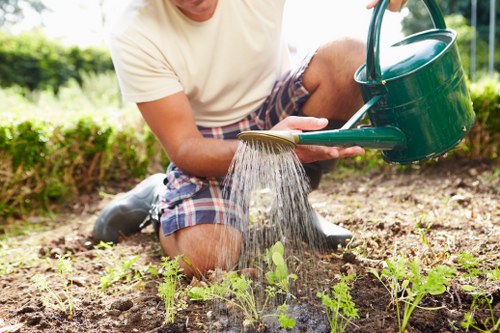
Introduction to Garden Maintenance
Maintaining a beautiful garden in Clapham requires dedication, knowledge, and the right strategies. Whether you're a seasoned gardener or a beginner, understanding the key aspects of garden maintenance in Clapham will help you cultivate a thriving outdoor space.
Clapham's unique climate and soil conditions offer both challenges and opportunities for garden enthusiasts. By implementing effective maintenance practices, you can ensure your garden remains healthy and picturesque throughout the year.
From seasonal planting to regular upkeep, this guide covers everything you need to know to keep your garden in top shape. Let's delve into the essential aspects of garden maintenance tailored specifically for Clapham residents.
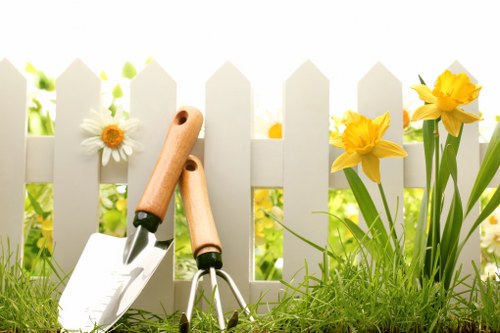
Understanding Clapham’s Climate and Soil
Climate Considerations
Clapham enjoys a temperate climate, characterized by mild winters and warm summers. This climate is conducive to a wide variety of plants, but it's important to choose species that thrive in these conditions.
Understanding the seasonal changes in Clapham will help you plan your garden maintenance activities more effectively. For instance, knowing when to plant, prune, and harvest can make a significant difference in your garden's success.
Additionally, being aware of local weather patterns, such as rainfall and temperature fluctuations, will enable you to protect your garden from potential threats like frost or excessive heat.
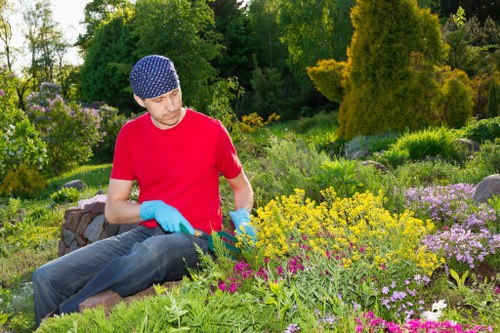
Essential Garden Maintenance Tasks
Regular Weeding
Weeds can quickly overrun your garden, competing with your desired plants for nutrients and water. Regular weeding is crucial to maintain the health and appearance of your garden.
Use a combination of manual removal and mulching to keep weeds at bay. Applying a layer of mulch not only suppresses weed growth but also helps retain soil moisture and regulate temperature.
Identifying and removing weeds before they set seed will reduce their prevalence in the future, making maintenance easier over time.
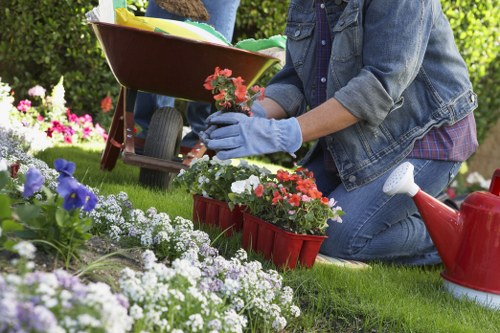
Lawn Care and Maintenance
Proper Mowing Techniques
A well-maintained lawn is the foundation of a beautiful garden. Regular mowing ensures your grass remains healthy and encourages dense growth.
Set your mower to the appropriate height for your grass type, usually around 2.5 to 3 inches. Avoid cutting more than one-third of the grass blade at a time to prevent stress.
Consider using a reel mower for a cleaner cut and to promote better lawn health. Additionally, varying your mowing pattern can prevent soil compaction and promote even growth.
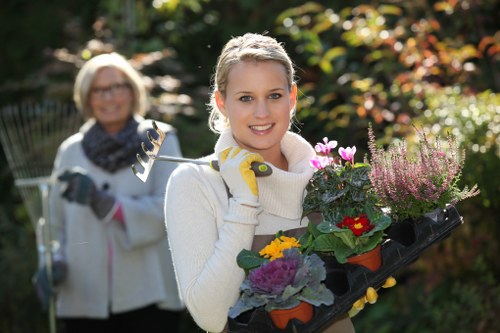
Seasonal Planting and Care
Spring Planting Tips
Spring is an ideal time for planting a variety of flowers, vegetables, and shrubs. Preparing your garden beds by enriching the soil with compost and organic matter will give your plants a strong start.
Select plants that are well-suited to Clapham’s spring conditions. Consider perennials that will return year after year, reducing the need for replanting.
Regular watering and monitoring for pests during the spring will help establish healthy plants that can thrive throughout the growing season.
Pruning and Trimming Techniques
Maintaining Plant Health
Pruning is essential for the health and aesthetics of your garden. Proper pruning techniques remove dead or diseased branches, promote airflow, and encourage new growth.
Different plants require different pruning methods. For example, roses benefit from regular deadheading, while fruit trees need more extensive pruning to shape and stimulate fruit production.
Always use sharp, clean tools to make precise cuts and prevent the spread of diseases. Pruning at the right time of year is also crucial for optimal plant health.
Soil Health and Fertilization
Enhancing Soil Fertility
Healthy soil is the foundation of a thriving garden. Regularly testing your soil can help you understand its composition and identify any deficiencies.
Amending your soil with organic matter, such as compost or well-rotted manure, improves its structure, drainage, and nutrient content.
Fertilizing your plants appropriately ensures they receive the essential nutrients needed for growth. Choose fertilizers based on your soil test results and the specific needs of your plants.
Watering Strategies for a Healthy Garden
Efficient Watering Practices
Proper watering is vital for plant health, especially during dry spells. Implementing efficient watering strategies conserves water and ensures your garden receives adequate moisture.
Early morning is the best time to water your garden, reducing evaporation and allowing plants to absorb moisture before the heat of the day.
Using drip irrigation systems or soaker hoses targets water directly to the plant roots, minimizing waste and promoting deep root growth.
Pest and Disease Management
Protecting Your Plants
Keeping pests and diseases under control is essential for maintaining a healthy garden. Regular monitoring and early intervention can prevent minor issues from escalating.
Encourage beneficial insects, such as ladybugs and bees, which help control pest populations naturally. Implementing crop rotation and companion planting can also reduce the likelihood of diseases and infestations.
When necessary, use organic or targeted treatments to address specific problems, ensuring minimal impact on the environment and beneficial wildlife.
Tools and Equipment for Garden Maintenance
Essential Gardening Tools
Having the right tools makes garden maintenance tasks easier and more efficient. Invest in high-quality tools that are comfortable to use and well-suited to your garden's needs.
Essential tools include a good pair of pruning shears, a sturdy shovel, a hoe for weeding, a rake for clearing debris, and a reliable watering system.
Regularly maintain your tools by cleaning and sharpening them, ensuring they remain effective and safe to use throughout the gardening season.
Creating a Sustainable Garden
Eco-Friendly Gardening Practices
Adopting sustainable gardening practices benefits both your garden and the environment. Focus on reducing waste, conserving water, and promoting biodiversity in your garden.
Composting kitchen scraps and garden waste recycles nutrients back into the soil, reducing the need for chemical fertilizers. Implementing rainwater harvesting systems can further conserve water.
Choose native plants that are well-adapted to Clapham’s climate, requiring less water and maintenance while providing habitats for local wildlife.
Hiring Professional Garden Maintenance Services
Benefits of Professional Help
While DIY garden maintenance is rewarding, hiring professionals can ensure that your garden receives expert care. Professional gardeners bring specialized knowledge and experience to manage complex maintenance tasks.
They can provide tailored advice on plant selection, soil health, and pest management, ensuring your garden remains healthy and vibrant year-round.
Consider scheduling regular maintenance visits or seeking help for specific projects to maintain the beauty and functionality of your Clapham garden.
Conclusion: Enjoy Your Beautiful Clapham Garden
Transform Your Outdoor Space
Effective garden maintenance in Clapham transforms your outdoor space into a beautiful and relaxing retreat. By understanding the local climate, implementing essential maintenance practices, and possibly enlisting professional help, you can achieve a lush and vibrant garden.
Remember to stay consistent with your maintenance routine, adapt to seasonal changes, and embrace sustainable gardening practices. With dedication and care, your garden will flourish, providing joy and beauty for years to come.
Contact us today to learn more about our garden maintenance services and start your journey towards a stunning Clapham garden!